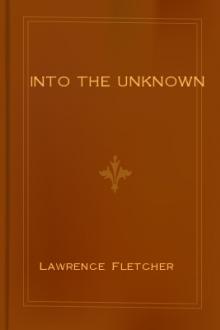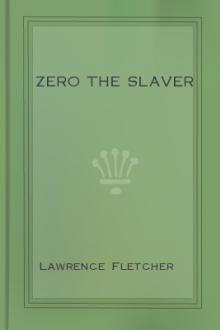Into the Unknown
Into the Unknown
A Romance of South Africa
Followed by Zero the Slaver.
Book Excerpt
at his extraordinary movements, and gradually and cautiously approached the Fall. Arrived there, his conduct became curious to a degree, for, lying flat on the rock, on the very edge of the basin indeed, where the spray from the cataract fell in a continuous and blinding shower, Grenville first commenced feeling about inside the rush of the water at the very back of the Fall, and finally buried himself, head and shoulders, in the water of the basin, frequently raising his head to take breath. After he had expended quite ten minutes in this edifying manner, he gave a grunt indicative of satisfaction, rose dripping wet, and retired into concealment behind the nearest rock, watching the Fall like a lynx.
Soon his patience was well rewarded, for a wonderful and beautiful thing happened. In a single instant the Fall grew gloriously light and beautiful, and the foaming, flashing surface of the water seemed by the touch of some fairy wand transformed into a stupendous rainbow of indescribable loveliness, as
Editor's choice
(view all)Popular books in Adventure, Fiction and Literature
Readers reviews
5.0
LoginSign up
http://www.cyclingnorthwales.co.uk/sketchbk/LAWRENCE%20FLETCHER%20final%20and%20illustrations.pdf
To quote from the above link regarding the author:
By 1879, Fletcher was a member of the Liverpool Amateur Bicycle Club and the Birkenhead Bicycle Club, winning races, and developing a liking for 24 hour rides. He put his average annual mileage at 15,000 miles and rode “hundreds of twenty-four hour races” (winning three Anfield 24 hour scratch events).
He competed in many place-to-place rides. In 1885 he broke the Land’s End – John O’Groats tricycle record (8 days 5 hours 20 minutes), while in 1892 he reduced the time to under four days (3 days, 23 hours 55 minutes) on a safety bicycle. Riding a Raleigh with Dunlops in September 1893 he claimed the 1000 mile world record (4 days 2 hours, 30 minutes) in conditions that would certainly have defeated a lesser mortal.
The man himself
Lawrence Fletcher was the fifth of eight children. The 1871 Census records the family living at
Litherland, north of Liverpool, and his father’s occupation as “ship broker”. By 1881, they had
moved to a large house on Edge Lane, near Wavertree Park, in Liverpool itself, run by a cook,
housekeeper, and maid. In 1886 Lawrence married Grace, a girl from Llanfairfechan, at Bangor,
Caernarvonshire. They set up home in Birkenhead39, on the Wirral side of the River Mersey.
By 1887 Fletcher was established in business with “well-appointed offices” in Central Chambers,
Liverpool’s South Castle Street. As head of “Fletcher & Fraser”, he was reported as carrying “the
same thoroughness with the business of life that he displays in pursuit of his favourite pastime”.
Without exception his contemporaries regarded him as “thorough”, “knowledgeable” and “astute in commercial undertakings”. Describing himself as an African Merchant, his company dealt on the Gold Coast of Africa in rubber and gold. In this context he was the Honorary Secretary of the Gold Coast Chamber of Commerce, an office which required “discretion and wide experience in African matters”.
Cycling and business notwithstanding he also found the time to write novels. Into the Unknown (published by Cassell & Co at 4/-), Zero the Slaver , and The Shadow of Death were based on his knowledge of Africa. One commentator noted that the African novels enabled Fletcher
to show his familiarity with the romantic side of African subjects. Zero the Slaver was “awaited with considerable interest by students of African fiction”. The fourth, Legend of the Land’s End, was first serialised in the Bristol Times and Irish Independent in 1897.
Business led him from Liverpool in 1893 to Africa and then to Cork where he lived while working for
the Dunlop Cycle Company. Despite these commitments, 1893 was nevertheless the year that he
found time to establish Irish End to End and 24 hour records, and to make the three abortive attempts on Land’s End – John O’Groats (the last turning into the 1000 mile record claim). On his return from Africa and Ireland he seems to have lived in Newcastle-on-Tyne.
In 1894 he again attacked the End to End record, and also the Edinburgh – London, but on both
occasions bad weather defeated him (illustration 9). From then on we read less of his active cycling.
What we do know is that in 1897 at the age of 36, with his family, he visited Australia and New Zealand. He was there partly under doctor's orders (over-work) and partly on business. After 1901 we find him in London, working for the Welsbach Company “well-known in the days of gas-lights in the home”.
Lawrence Fletcher died on the 28th March 1933 in his 72nd year and was cremated at Golders Green,
London.
To quote from the above link regarding the author:
By 1879, Fletcher was a member of the Liverpool Amateur Bicycle Club and the Birkenhead Bicycle Club, winning races, and developing a liking for 24 hour rides. He put his average annual mileage at 15,000 miles and rode “hundreds of twenty-four hour races” (winning three Anfield 24 hour scratch events).
He competed in many place-to-place rides. In 1885 he broke the Land’s End – John O’Groats tricycle record (8 days 5 hours 20 minutes), while in 1892 he reduced the time to under four days (3 days, 23 hours 55 minutes) on a safety bicycle. Riding a Raleigh with Dunlops in September 1893 he claimed the 1000 mile world record (4 days 2 hours, 30 minutes) in conditions that would certainly have defeated a lesser mortal.
The man himself
Lawrence Fletcher was the fifth of eight children. The 1871 Census records the family living at
Litherland, north of Liverpool, and his father’s occupation as “ship broker”. By 1881, they had
moved to a large house on Edge Lane, near Wavertree Park, in Liverpool itself, run by a cook,
housekeeper, and maid. In 1886 Lawrence married Grace, a girl from Llanfairfechan, at Bangor,
Caernarvonshire. They set up home in Birkenhead39, on the Wirral side of the River Mersey.
By 1887 Fletcher was established in business with “well-appointed offices” in Central Chambers,
Liverpool’s South Castle Street. As head of “Fletcher & Fraser”, he was reported as carrying “the
same thoroughness with the business of life that he displays in pursuit of his favourite pastime”.
Without exception his contemporaries regarded him as “thorough”, “knowledgeable” and “astute in commercial undertakings”. Describing himself as an African Merchant, his company dealt on the Gold Coast of Africa in rubber and gold. In this context he was the Honorary Secretary of the Gold Coast Chamber of Commerce, an office which required “discretion and wide experience in African matters”.
Cycling and business notwithstanding he also found the time to write novels. Into the Unknown (published by Cassell & Co at 4/-), Zero the Slaver , and The Shadow of Death were based on his knowledge of Africa. One commentator noted that the African novels enabled Fletcher
to show his familiarity with the romantic side of African subjects. Zero the Slaver was “awaited with considerable interest by students of African fiction”. The fourth, Legend of the Land’s End, was first serialised in the Bristol Times and Irish Independent in 1897.
Business led him from Liverpool in 1893 to Africa and then to Cork where he lived while working for
the Dunlop Cycle Company. Despite these commitments, 1893 was nevertheless the year that he
found time to establish Irish End to End and 24 hour records, and to make the three abortive attempts on Land’s End – John O’Groats (the last turning into the 1000 mile record claim). On his return from Africa and Ireland he seems to have lived in Newcastle-on-Tyne.
In 1894 he again attacked the End to End record, and also the Edinburgh – London, but on both
occasions bad weather defeated him (illustration 9). From then on we read less of his active cycling.
What we do know is that in 1897 at the age of 36, with his family, he visited Australia and New Zealand. He was there partly under doctor's orders (over-work) and partly on business. After 1901 we find him in London, working for the Welsbach Company “well-known in the days of gas-lights in the home”.
Lawrence Fletcher died on the 28th March 1933 in his 72nd year and was cremated at Golders Green,
London.
- Upvote (0)
- Downvote (0)

 Free Download
Free Download























-itok=vcKIB5v1.jpg)
